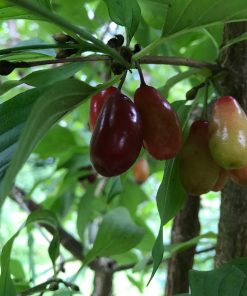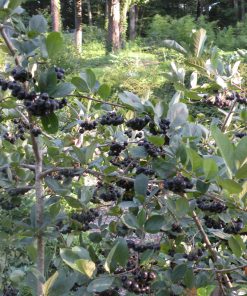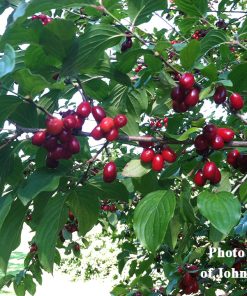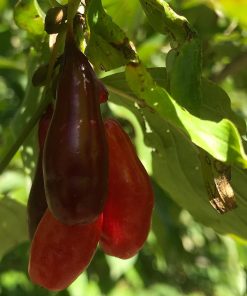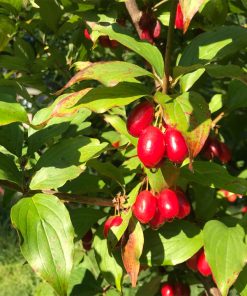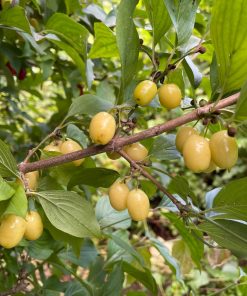Cudrania, ‘Daniecki’ male Che Chinese Melonberry SPRING 2025 PRE-ORDER Cricket Hill Garden
$ 45,00 $ 27,00
Cudrania tricuspidata ‘Daniecki’
Name in Chinese and pin yin: 柘 zhe
Variety description: This under appreciated fruit is a relative of mulberry and fig, and is native to central China. In addition to being grown for its fruit, traditionally Che leaves were used as a secondary food source for silk worms. Male trees produce a profusion pollen bearing berries which drop off after the pollen is shed. This tree should be must be planted with a female selection such as ‘Norris’ or ‘Darrow’ if fruit is desired. Pollinated fruit will be larger and produce seed.
We graft our Che onto Osage orange (Maclura pomifera) rootstock so that as the plant matures it will develop less of a bush and more of a standard tree form. Young plants have small thorns.
This selection of male che comes to us from renowned nurseryman Cliff England. He in turn received the original scion material from Ted Daniecki, who found the original tree growing in somewhere in New Jersey. It was selected for propagation because it sets heavy berry pollen.
Site requirements: Full sun location. Che will grow in a range of soil types provided that the roots stay evenly moist throughout the heat of the summer. Deep, well drained loam is ideal.
Size at maturity: 10-25′ tall, 25′ wide, depending on pruning.
Hardiness: USDA zones 5b-9. There are some reports of Che growing in USDA zone 5. Cooler climates may have insufficient summer heat to fully ripen the fruit.
Pests and Diseases: None observed. Birds will eat the fruit if you are late to harvest and deer may browse both the fruit and foliage. We protect young trees with a circle of wire mesh to keep the deer away.
Plant size: Grafted tree, 2-3 ft. tall with strong central leader. Field grown, ships bare root.
When we ship: Spring 2025.
Shipping restrictions: None.
| Size | 2-3' tree, 1' tree |
|---|
Fast Shipping and professional packaging
We offer a wide range of shipping options due to our long-standing partnerships with UPS, FedEx and DHL. Our warehouse staff will package all goods to our exacting specifications. Prior to shipping, your goods will be thoroughly inspected and secured. We ship to thousands customers every day across multiple countries. Our commitment to become the biggest online retailer around the globe is evident by this. The warehouses are located situated in Europe in the same way as they are in USA.
Orders with more than one item are assigned processing times for each item.
We will carefully examine all items ordered before shipping. The majority of orders are delivered within 48 hrs. The delivery time will be between 3-7 days.
Returns
Due to multiple entities which include the factory as well as the warehouse, we cannot effectively manage inventory. The stock levels may fluctuate at any time. It is possible that your order may be out of stock once your order has been made.
Our policy is for 30 days. If 30 days have gone without a trace since the purchase however, we're unable to give you a return or exchange.
The item must not be used, and it must be in the original packaging. It should also be returned in its original packaging.
Related products
Landscape edibles
Landscape edibles
Landscape edibles
Landscape edibles
Landscape edibles
Aronia melanocarpa, ‘Nero’ SPRING 2025 PRE-ORDER Cricket Hill Garden
Landscape edibles
Landscape edibles
Landscape edibles
Landscape edibles
Landscape edibles
Landscape edibles
Landscape edibles
Cornus, open-pollinated seedling of ‘Elegant’ Cornelian Cherry Cricket Hill Garden
Landscape edibles
Landscape edibles
Landscape edibles
Landscape edibles
Landscape edibles
Cudrania, ‘Darrow’ seedless female Che Chinese Melonberry SPRING 2025 PRE-ORDER Cricket Hill Garden
Landscape edibles
Cudrania, ‘Norris’ female Che Chinese Melonberry Cricket Hill Garden
Landscape edibles
Diospyros virginiana, Persimmon seedling Cricket Hill Garden
Landscape edibles
Landscape edibles
Landscape edibles
Landscape edibles
Landscape edibles
Landscape edibles
Landscape edibles
Landscape edibles
Landscape edibles




